
Westphalia is a region of northwestern Germany and one of the three historic parts of the state of North Rhine-Westphalia. It has an area of 20,210 square kilometres (7,800 sq mi) and 7.9 million inhabitants.

North Rhine-Westphalia or North-Rhine/Westphalia, commonly shortened to NRW, is a state (Land) in Western Germany. With more than 18 million inhabitants, it is the most populous state in Germany. Apart from the city-states, it is also the most densely populated state in Germany. Covering an area of 34,084 square kilometres (13,160 sq mi), it is the fourth-largest German state by size.

The Ems is a river in northwestern Germany. It runs through the states of North Rhine-Westphalia and Lower Saxony, and discharges into the Dollart Bay which is part of the Wadden Sea. Its total length is 362.4 kilometres (225.2 mi). The state border between the Lower Saxon area of East Friesland (Germany) and the province of Groningen (Netherlands), whose exact course was the subject of a border dispute between Germany and the Netherlands, runs through the Ems estuary.

The Sieg is a river in North Rhine-Westphalia and Rhineland-Palatinate, Germany. It is a right tributary of the Rhine.

The Inde is a small river in Belgium and in North Rhine-Westphalia, Germany

The Heller is a 30 km long river in western Germany. It is a left tributary of the Sieg. The source is located near Haiger in Hesse. It flows through Burbach and Neunkirchen in North Rhine-Westphalia. It flows into the river Sieg in Betzdorf, Rhineland-Palatinate. Its basin area is 204 km².

The Wupper is a right tributary of the Rhine in the state of North Rhine-Westphalia, Germany. Rising near Marienheide in western Sauerland it runs through the mountainous region of the Bergisches Land in Berg County and enters the Rhine at Leverkusen, south of Düsseldorf. Its upper course is called the Wipper. Both names are related to "weave", and refer to the twisting course.

The Düssel is a small right tributary of the river Rhine in North Rhine Westphalia, Germany. Its source is east of Wülfrath. It flows westward through the Neander Valley where the fossils of the first known to be Neanderthal man were found in August 1856. At Düsseldorf it forms a river delta by splitting into four streams, which all join the Rhine after a few kilometres. The Nördliche Düssel flows through the Hofgarten and passes under the Golden Bridge.
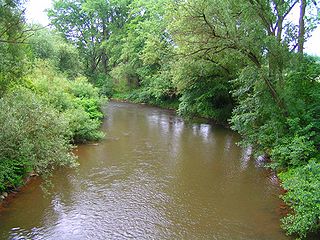
The Kyll, noted by the Roman poet Ausonius as Celbis, is a 128-kilometre-long (80 mi) river in western Germany, left tributary of the Moselle. It rises in the Eifel mountains, near the border with Belgium and flows generally south through the towns Stadtkyll, Gerolstein, Kyllburg and east of Bitburg. It flows into the Moselle in Ehrang, a suburb of Trier.

The Agger is a river in Germany, a right tributary of the Sieg in North Rhine-Westphalia. It is 69.5 kilometres (43.2 mi) long. Its source is in the Sauerland hills, near Meinerzhagen. It winds through the towns Engelskirchen, Overath and Lohmar. Near Siegburg the Agger flows into the Sieg.
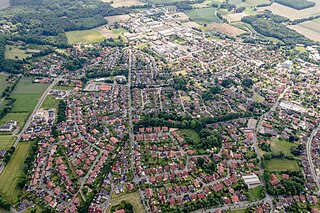
Ostbevern is a municipality in the district of Warendorf, in North Rhine-Westphalia, Germany.

The Egge Hills, or just the Egge is a range of forested hills, up to 464 m above sea level (NN), in the east of the German state of North Rhine-Westphalia.
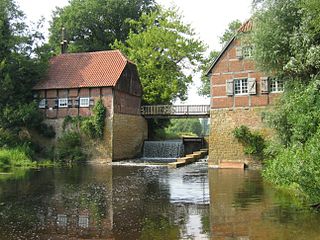
The Bever is an approximately 40-kilometre-long (25 mi) river in western Germany, right tributary of the river Ems. It has its springs in the Teutoburg Forest. It runs through the northern part of North Rhine-Westphalia and flows into the Ems near Telgte (Westbevern). Another town on the Bever is Ostbevern.

Emmer is a river of Lower Saxony and North Rhine-Westphalia, Germany. It flows into the Weser in Emmerthal.
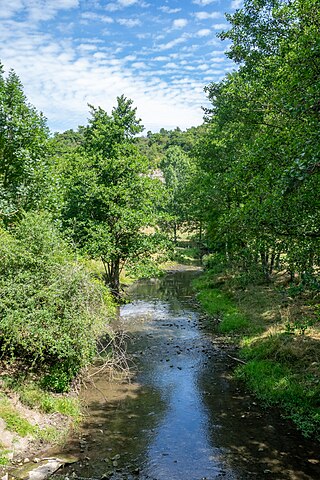
Eggel is a river of North Rhine-Westphalia, Germany. It is a left tributary of the Diemel. Its lower section defines the boundary between North Rhine-Westphalia and Hesse.

The Twiste is a river of Hesse and of North Rhine-Westphalia, Germany. It is the most important tributary of the Diemel, which it joins in Warburg. Its largest tributaries are the Erpe, Watter, Aar and Wande.
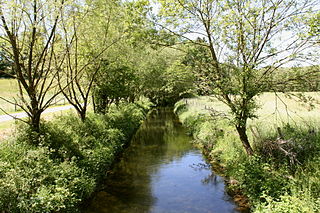
Bever is a river of North Rhine-Westphalia, Germany.
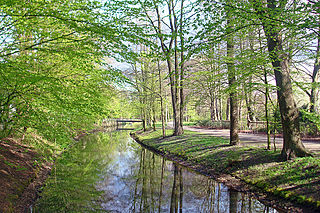
Dalke is a river of North Rhine-Westphalia, Germany. It flows into the Ems near Gütersloh.
Moorbach is a small river of North Rhine-Westphalia, Germany. It is a right tributary of the Bever.

The Laschet cabinet was the state government of North Rhine-Westphalia between 2017 and 2021, sworn in on 30 June 2017 after Armin Laschet was elected as Minister-President of North Rhine-Westphalia by the members of the Landtag of North Rhine-Westphalia. It was the 24th Cabinet of North Rhine-Westphalia.



















